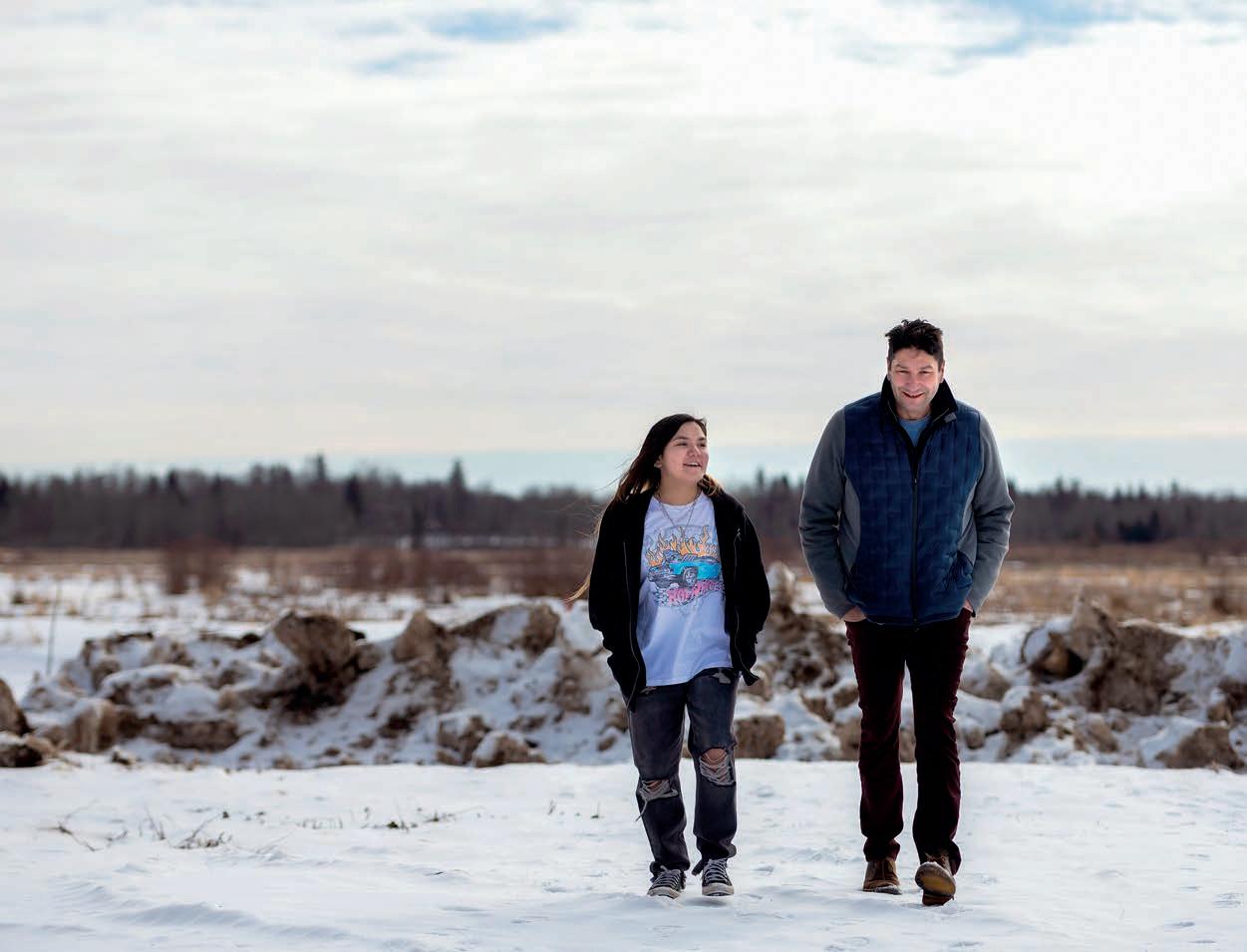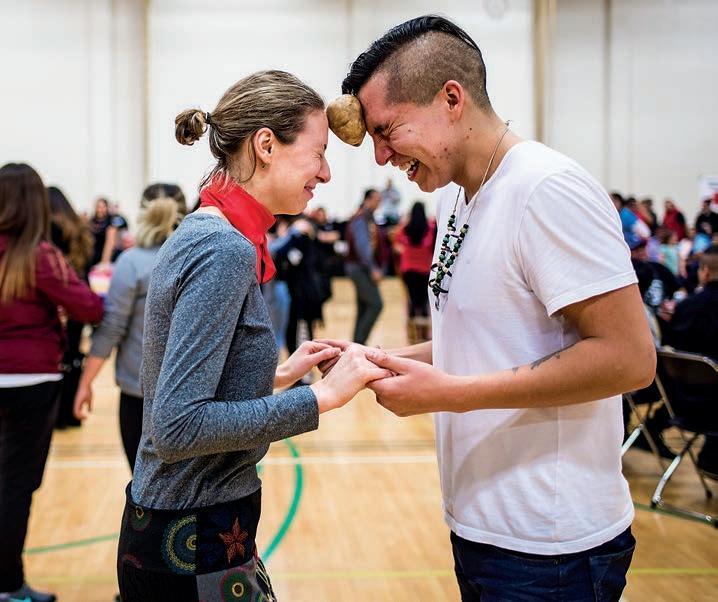
7 minute read
Message from the Vice-Provost, Indigenous Programming and Research
The Indigenous Strategic Plan reflects our hopes and provides a vision and directions to put things into action. Its critical investment in long-term, systemic change assures that generations of the past, present and future will thrive at the University of Alberta, in our homes and in our communities.” Cindy Gaudet
Professeure assistante, Campus Saint‑Jean
Participants in the potato dance attempt to dance with the beat during the University of Alberta’s Annual Round Dance. The last couple remaining with the potato still between their foreheads wins — a good omen for their relationship. Braiding Past, Present and Future: University of Alberta Indigenous Strategic Plan calls on us to weave Indigenous Ways of Knowing into our work with reverence. We commit to achieving this by collaborating with students, faculty, staff and community members to amplify Indigenous voices, showcase the incredible diversity of the campus community, and honour the traditional territories where the University of Alberta is situated. By communicating broadly the research of Indigenous students and faculty — and by facilitating education that furthers Truth and Reconciliation — we will continue to work towards decolonization both on campus and in the broader community.” Elan MacDonald
Vice‑President, External Relations

Dr. Sean Lessard, associate professor in the Faculty of Education, works with students at Maskêkosak Kiskinomâtowikamik school at Enoch Cree Nation.
I have been profoundly impacted, both personally and professionally, through various learnings which allow me to better understand the significance and impact of Indigenous history and culture. I affirm our commitment to Indigenize the institution through such actions as adapting our recruitment practices, doing all we can to increase retention of Indigenous employees, ensuring we have policies and practices to build an anti-racism culture, and establishing safe and welcoming spaces. I endeavour to demonstrate the University of Alberta understands we have emerged into a new era that requires different standards and practices.” Todd Gilchrist
This Indigenous Strategic Plan was undertaken in the most respectful manner possible, with a wide array of constituents and partners, on and off our campuses. The plan itself is comprehensive — operationally and strategically — and offers academic leaders and, indeed, all faculty, staff and students on campus a number of different pathways for fulfilling their responsibilities to the TRC and to working with Indigenous faculty, staff, students, communities and nations in ethical ways. Dr. Glanfield and her team are to be congratulated for their humility and their labour in creating this plan. It is now up to us to carry it out with the same spirit with which it was created.” Chris Andersen
Dean, Faculty of Native Studies
Chief Dr. Robert Joseph, “Healing a Nation Through Truth and Reconciliation,” is my inspiration and the reason I strongly believe in this strategic plan. Dr. Joseph tells us that “when we are reconciled we will live together peacefully and in harmony. When we are reconciled we will be gentle with each other, we will be caring and compassionate. …We will know we are reconciled when every kid knows that they are important, valued, and that they are loved and have a future in our great country.” Valerie Hunter
HR Service Partner, Human Resource Services, Partnerships


Truth and Reconciliation Commission of Canada,
Honouring the Truth, Reconciling for the Future
University of Alberta Response
Since UNDRIP was passed and the TRC Calls to Action were issued, the University of Alberta has responded by engaging in wide-ranging consultations via its institutional strategic plan, For the Public Good (2016), the Strategic Plan for Equity, Diversity and Inclusivity (2018), University of Alberta for Tomorrow (2021) and the University of Alberta brand (2021).
As directed by these consultations, the university has committed to work on respectful responses to the Calls to Action and reconciliation.
These commitments have begun to find their ways into the university’s academic and administrative practices, with the goal that they will eventually be fully embedded across strategic and unit plans and accountabilities.
To lead and co-ordinate work in Indigenous Initiatives, the University of Alberta sought to create the structures that can carry this work forward. In 2019, the inaugural role of Vice-Provost, Indigenous Programming and Research was established in the Office of the Provost and VicePresident (Academic).
The work of the Vice-Provost, Indigenous Programming and Research Office builds upon and continues the extensive work undertaken across the University of Alberta to assure Indigenous student success, improve the recruitment and retention of Indigenous faculty and staff, and advance key initiatives in alignment with Indigenous community interests. The office will centrally connect Indigenous-related teaching, learning, research and supports to co-ordinate initiatives, share resources, find efficiencies and build capacity. Community Engagement
Seek, build, strengthen, and sustain partnerships with local, national, or international research agencies, governments, government ministries and agencies, univers ities, Indigenous communities, libraries, not-for-profits, industry, business, and community organizations. (Engage, Obj. 18)
Signature Areas
Build a portfolio of signature research and teaching areas where the University of Alberta is or will be recognized as a global leader. (Excel, Obj. 12)
Diversity
Build a diverse, inclusive community of exceptional undergraduate and graduate students from Edmonton, Alberta, Canada, and the world
Create a faculty renewal program that builds on the strengths of existing faculty and ensures the sustainable development of the U of A’s talented, highly qualified, and diverse academy Support ongoing recruitment and retention of a highly-skilled, diverse community of non-academic and administrative staff by enriching the U of A’s working environment. Build and strengthen trust, connection, and a sense of belonging among all members of the university community through a focus on shared values.
(Build, Obj. 1-4)
Commits to Respect for Reconciliation with Indigenous Peoples as a key goal with work to the ISP; equity and capacitybuilding are also outlined as key goals. University of Alberta for Tomorrow (2021)
The University of Alberta resides on Treaty 6 territory and the homeland of the Métis. This territory is a traditional gathering place for diverse Indigenous peoples whose histories, languages and cultures continue to influence our community. To acknowledge the territory is to recognize the longer history of these lands. The acknowledgement signifies our commitment to working in Good Relations with First Nations, Métis, and Inuit peoples as we engage in our institutional work, uplifting the whole people, for the university for tomorrow.
For the Public Good (2016)
University of Alberta Brand (2021)
Working together alongside and in partnership with Indigenous Peoples and all under-represented voices. We weave together a tapestry of backgrounds and cultures, because we are made stronger by our diversity. Together we are change makers, community builders, world shapers. This world has been challenged like never before. But when we stand together and listen to one another, we generate the solutions that make us healthier, safer, stronger and more just.
Indigenous Alumni Partner to create and liaise with the Indigenous Alumni Chapter.
Representation Chair the Council on Aboriginal Initiatives Equity, Diversity and Inclusivity Foster a supportive environment for Indigenous faculty, staff and students.
Ethical Research Engagement Develop and implement ethical policies and procedures to guide engagement with Indigenous communities.
Aims to support institutional capacity building efforts, equity work and foundational change. The mandate enumerates the following priorities: Indigenization Support the work of Faculties and Departments to Indigenize curricula across programs.
Community Engagement Build and nurture positive relationships with Indigenous communities in Alberta.
Indigenous Strategic Plan Lead development, consultation, and approval of the Indigenous Strategic Plan in support of the objectives articulated in For the Public Good.
Calls to Action
Develop a “thoughtful, respectful, meaningful, and sustainable response” to the report of the Truth and Reconciliation Commission of Canada (Build, Obj. 4) Reconciliation Learning Foster learning opportunities across our campuses that enable student, staff, and faculty participation in reconciliation. (Build, Obj. 4, Str. i)
Curricular Calls upon PSIs to make curricular changes to address the knowledge gap regarding Indigenous histories and contemporary experiences in child welfare, language/ culture, health, justice, media, sports and business as well as a call to create reconciliation research. (TRC Calls to Action) Representation Calls upon PSIs to increase the number of Indigenous professionals in named faculties and beyond. (TRC Calls to Action) Recruitment, Retention, Completion Calls upon PSIs to eliminate educational and employment gaps for Indigenous peoples as well as to adequately fund (federal government) the backlog of FNMI students seeking post-secondary education. (TRC Calls to Action) Reconciliation Metrics Evaluate and measure the university’s response to the TRC’s Calls to Action and ensuring effectiveness on an ongoing basis. (Build, Obj. 4, Str. iii)
Maskwa House Build the Maskwa House of Learning as a place of welcome and cultural connection, where all Indigenous and non-Indigenous students together can grow and celebrate the unique and proud histories of Indigenous peoples, and where Indigenous students can access the social, cultural, and spiritual supports that enable their success. (Build, Obj. 4, Str. ii)








